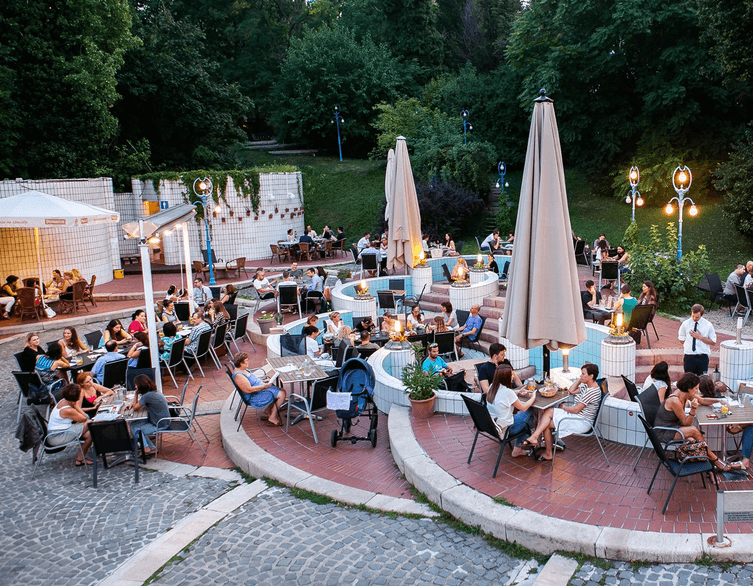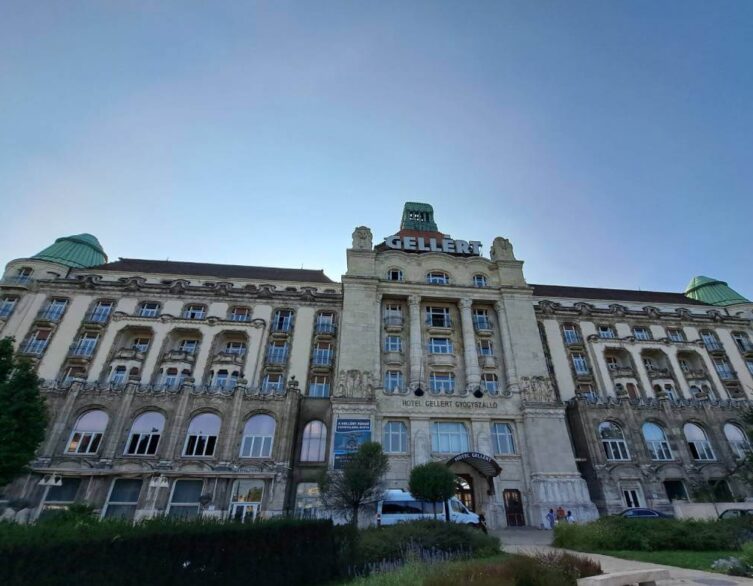Goodbye Pagony: Budapest’s Cult Garden Bar and the Gellért Complex Close Their Doors

Budapest is set to lose another piece of its cultural heritage as the beloved Pagony garden bar faces demolition to make way for luxury housing development. The popular outdoor venue, which operated from 2014 to 2021 in the former children’s pools of the Gellért Baths, has become the latest casualty in Budapest’s ongoing gentrification wave.
The End of an Era for Pagony
The Pagony quickly achieved cult status among both locals and tourists as one of Budapest’s most atmospheric garden venues. Located in the distinctive blue-and-white surroundings of the former Gellért children’s pools, this unique establishment transformed abandoned swimming facilities into a charming outdoor dining and drinking space. For eight summers, visitors could enjoy meals and cocktails where children once played in the water, creating an unforgettable Budapest experience that perfectly captured the city’s ability to repurpose its historical spaces.
The venue’s closure in October 2021 left many wondering about its future, with no official explanation provided at the time. However, recent developments have revealed the true reason behind its disappearance: the land has been sold for luxury residential development.
Neighboring Gellért Complex Also Closing for Major Renovation
The transformation of the Pagony site comes at a particularly significant time for the entire Gellért area, as both the adjacent Gellért Hotel and the famous Gellért Thermal Bath are also undergoing major closures and renovations. The iconic Gellért Thermal Bath, which has welcomed visitors since 1918, will close its doors on September 30, 2025, for an extensive three-year renovation project.
This closure affects one of Budapest’s most beloved thermal spa destinations, which attracted approximately 420,000 visitors last year alone. The Art Nouveau masterpiece, considered the second most popular thermal bath in Budapest after Széchenyi, will remain closed until 2028 while undergoing a comprehensive reconstruction estimated at around €50 million.
Best deals of Budapest
The Gellért Hotel has already been closed since 2019 and is currently undergoing its own ambitious restoration project. The hotel is set to reopen in 2027 under the management of the prestigious Mandarin Oriental Hotel Group, featuring 134 rooms including 34 suites, all carefully restored to honor its historical significance while meeting modern luxury standards.
Luxury Development Takes Over
The Market Asset Management company, connected to Hungarian oligarch István Garancsi, has acquired the 1.1-hectare site and plans to build the “Gellért Green Residences” – a complex featuring 32 luxury apartments across three buildings. The development will include two 14-apartment residential buildings and one 4-apartment villa, complete with wellness facilities, fitness amenities, and an underground garage.
While developers promise to increase green space from the current 97 trees to 132 new plantings, critics argue this cannot compensate for the loss of public access to this historically significant area. The project represents a broader trend affecting Budapest’s most valuable green spaces, particularly on the Buda side, where luxury developments are increasingly replacing accessible public areas.
Historical Significance Under Threat
The site holds considerable historical importance, having served as children’s pools for the famous Gellért Baths from 1985 to 2008. These facilities were connected to the main bath complex through an underground tunnel and featured playful, winding pathways designed by renowned Hungarian architects. The area originally functioned as sunbathing grounds for the baths since their opening in 1918.
One positive aspect of the development involves the restoration of the site’s monument-protected former heating house, which will be converted into recreational facilities while preserving its historical character. This restoration will be carried out in cooperation with heritage protection authorities.
Community Concerns and Public Access
Local residents have expressed significant disappointment about losing public access to this green space. Community forums have raised concerns about increased construction density, reduced accessible green areas, and the general trend of privatizing formerly public spaces in this UNESCO World Heritage environment.
The development represents a common pattern in Budapest’s urban development, where valuable public spaces are transformed into exclusive private properties accessible only to wealthy residents. Many locals feel that community consultation meetings were used more for information distribution than genuine dialogue about the project’s impact.
Broader Context of Budapest’s Development Wave
This project is part of a larger development boom affecting Budapest’s most valuable areas. The luxury housing trend particularly impacts the Buda Hills and other premium locations, where formerly public or semi-public spaces are being converted into exclusive residential complexes.
The Pagony’s transformation reflects Budapest’s changing character, where unique cultural venues that contributed to the city’s charm and accessibility are being replaced by sterile, high-end developments. This trend concerns many who see Budapest losing its authentic, accessible character in favor of developments that cater primarily to wealthy residents.
Tourism Impact
For foreign tourists who discovered Budapest partly through its unique venues like Pagony, these changes represent a significant loss. The garden bar offered an authentic Budapest experience that couldn’t be replicated elsewhere – dining and drinking in a repurposed historical space that told the story of the city’s creative adaptation of its heritage.
The simultaneous closure of multiple Gellért area attractions creates a perfect storm for tourism in this UNESCO World Heritage environment. For several years, visitors to Budapest will be unable to experience either the world-famous thermal baths or stay at the historic hotel, while the former Pagony site transforms into exclusive private housing.
The replacement of such venues with luxury housing removes these distinctive experiences from Budapest’s tourism offering, potentially making the city less unique and memorable for international visitors seeking authentic local culture.
Timeline and Future
Construction work began in September 2025, with completion expected by the third quarter of 2027. The developers have committed to improving surrounding streets and sidewalks as part of their community contribution, though this does little to address the loss of public access to the green space itself.
Meanwhile, the Gellért Bath renovation will continue until 2028, and the hotel is scheduled to reopen in 2027 under new management. When the area eventually reopens, visitors will find a dramatically transformed landscape where accessible cultural venues have been replaced by exclusive luxury amenities.
As Budapest continues to grapple with balancing development needs against heritage preservation and public access, the Pagony’s fate serves as a stark reminder of what the city stands to lose when commercial interests take precedence over cultural and community values.
The transformation of this beloved venue into exclusive luxury housing represents more than just one development project – it symbolizes a broader shift in Budapest’s character that may ultimately diminish what makes the city special for both residents and the international visitors who contribute significantly to its economy.
Related news
Related events













